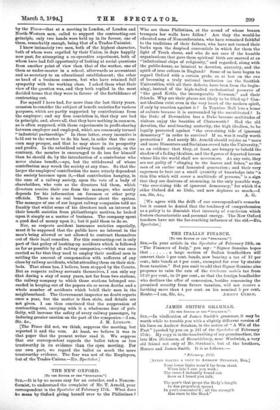THE NEW OXFORD.
pro Tins EDITOR OF THE "SPECTATOR."] Sin,—It is by no means easy for an outsider, and a Noncon- formist, to understand the complaint of Mr. T. Arnold, your correspondent in the Spectator of February 17th. What does he mean by Oiford giving herself over to the Philistines ? Who are these Philistines, at the sound of whose brazen trumpets her walla have fallen ? Are they the would-be educated sons of Nonconformists, who have remained faithful to the traditions of their fathers, who have not turned their backs upon the despised conventicle in which for them the light of Truth shone, and who do not care if the humble organisations that gave them spiritual birth are sneered at as "infinitesimal chips of religiosity," and regarded, along with the public-house, as inimical to devotion, austerity, and the spirit of true culture in England? Some of us have begun to regard Oxford with a certain pride, as at last on the eve of becoming a truly national institution (as the Scottish Universities, with all their defects, have been from the begin- ning), instead of the high-walled ecclesiastical preserve of "the good Keble, the incomparable Newman," and their friends. Why are their places not likely to be filled up ? Can- not idealism exist even in the very heart of the modern spirit, if only by reaction against it ? Is Toynbee Hall less a home of culture because it is surrounded by the uncultivated ? Is the Duke of Devonshire leas a Duke because multitudes of visitors enjoy the beauties of Chatsworth? Had the old devotion, the soul-bracing austerity, the high idealism, to be legally protected against "the ever-rising tide of ignorant democracy" in order to survive? If so, was it really worth protection ? And surely Mr. Arnold should rejoice as "more and more Dissenters and Socinians crowd into the University,' as an evidence that they, at least, are hungry to behold the shadow of a fading idealism, and the figures of departed heroes whose like the world shall see nevermore. At any rate, they are not guilty of "clinging to the loaves and fishes," as the men of an earlier and lamented generation ; and their very eagerness to beat out a small quantity of knowledge into "a thin film which will cover a multitude of persons," is a sign that they are desirous of stemming, in the only possible way, "the ever-rising tide of ignorant democracy," for which tie older Oxford did so little, and now deplores so much.—I
[We agree with the drift of our correspondent's remarks but it cannot be denied that the tendency of comprehension as a policy is to diminish that intensity of conviction which fosters characteristic and personal energy. The New Oxford teachers have not the far-reaching influence of the old.—En. Spectator.]






































 Previous page
Previous page